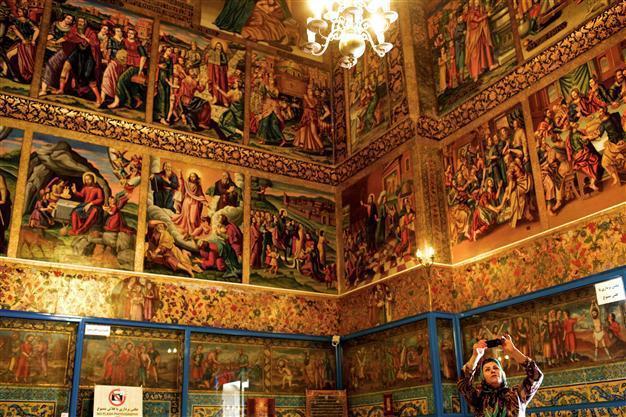Iran looks to Turkey for post-sanctions tourism boom
TEHRAN

AFP Photo
As Iran sees the light at the end of the tunnel of Western sanctions due to a recent deal, the Islamic republic is preparing to cooperate with Turkey in the field of tourism, according to a senior statesman.“The leaders of both countries have expressed their determination on the issue,” said Masoud Soltanifar, the Iranian vice president and Cultural Heritage and Tourism Organization chief, during a press conference in Tehran, the Anadolu Agency reported on April 23.
The two countries are projecting to cooperate in the construction of new hotels, carrying renowned hotel chains to the country and operating tours, Soltanifar said, praising Turkey as an experienced country in the field.
Turkish President Recep Tayyip Erdoğan met with his Iranian counterpart, Hassan Rouhani, on April 7 in a Tehran meeting under the shadow of the differences between the two countries, particularly on the Saudi-led airstrikes against Yemeni rebels and the war in Syria.
Global tourism revenues stood at $1.5 trillion last year, though Iran received just 0.5 percent of it, said the Iranian official.
Iran stood at 46th in terms of attracting foreign tourists and ranked 33rd in terms of revenues from foreign visitors, Soltanifar said.
“We aim at 20 million foreign tourists in 2025, increasing revenues to $30 billion,” he said.
Turkey has been investing in tourism for 25 or 30 years, he said, noting that he also expected more Turkish visitors to the country.
The number of foreign tourists visiting Iran via tour operators jumped 96 percent last year over the previous year, but tourism in the country is still under the negative influence of the U.S and Western sanctions, he said.
Soltanifar also said the sanctions were putting a burden on the Iranian air fleet.
“We cannot buy parts for some of our planes which cannot fly now because of the sanctions. We were prevented from buying new planes, thus there is no direct flight to Tehran to the capital cities of some countries,” he said.
Foreign investors have also been blocked from investing in Iran, he complained, raising hopes that many companies would seek Iranian businesses once the sanctions end.
Iran and major world powers were holding a second day of talks on April 23, seeking to finalize a historic deal that would make any attempt by Tehran to make a nuclear weapon extremely difficult and easily detectable.
Meeting in Vienna, Iran and the five permanent members of the U.N. Security Council plus Germany wanted to turn a framework accord reached in Switzerland on April 2 into a full agreement by June 30.
Iran, which has denied wanting the atomic bomb, is set to scale down its nuclear program for 10 to 15 years or more, depending on the area of activity, and allow closer U.N. inspections.
The exact details of how this will work in practice, and in particular the scale and timeframe under which the powers will lift the painful sanctions, still needed to be nailed down and experts have warned it will be a difficult process.
















